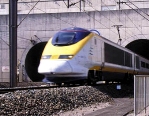Delayed Payments After Fire Cause Eurotunnel Loss
Traffic and revenues rose 22 percent at a constant exchange rate, but the company operating the Channel Tunnel posted a first-half loss because 48 million euros' worth of indemnities have been held up since May 2009.
Eurotunnel SA, the company that operates trains through the Channel Tunnel between England and France, on July 19 reported higher traffic and revenues for the first half of 2010 versus one year ago, but the company posted a 45 million euro ($58 million U.S.) loss because it has not collected 48 million euros' worth ($61 million U.S.) of indemnities from its insurers to cover losses in a September 2008 fire.
Traffic for Eurotunnel Shuttles and the Eurostar trains rose by these amounts in the first half of 2010, the company reported:
- Truck shuttles (+ 41 percent)
- Passenger shuttles (cars + 17 percent, coaches + 8 percent)
- Eurostar (+ 6 percent)
 Revenues at a constant exchange rate rose by 22 percent. "The first half of 2010 has seen significant progress in all traffic (Eurotunnel Shuttles and Eurostar) and an increase in the Group's revenues," according to the company's announcement, "despite the economic situation remaining difficult and the bad weather at the start of the year. The return of truck traffic increased during the second quarter. Results would have been higher had €48 million of indemnities for losses resulting from the fire in September 2008 not been blocked since May 2009."
Revenues at a constant exchange rate rose by 22 percent. "The first half of 2010 has seen significant progress in all traffic (Eurotunnel Shuttles and Eurostar) and an increase in the Group's revenues," according to the company's announcement, "despite the economic situation remaining difficult and the bad weather at the start of the year. The return of truck traffic increased during the second quarter. Results would have been higher had €48 million of indemnities for losses resulting from the fire in September 2008 not been blocked since May 2009."
The fire occurred Sept. 11, 2008, on a freight train bound for France while the train was inside one of the two rail tunnels.
Jacques Gounon, chairman and chief executive of Groupe Eurotunnel SA, said, "I am pleased that traffic and revenues have both increased in the current economic crisis. However, if our insurance payments remain blocked, we shall be unable to declare a profit this year."
During the first half of this year, Eurotunnel acquired GB Railfreight Limited, the third-largest rail freight operator in Britain, won a contract to manage the rail freight zone at the port of Dunkirk, completed a wind farm at its Coquelles terminal in France, and installed living quarters at the same Coquelles terminal for French military troops in preparation for the London 2012 Olympic Games.